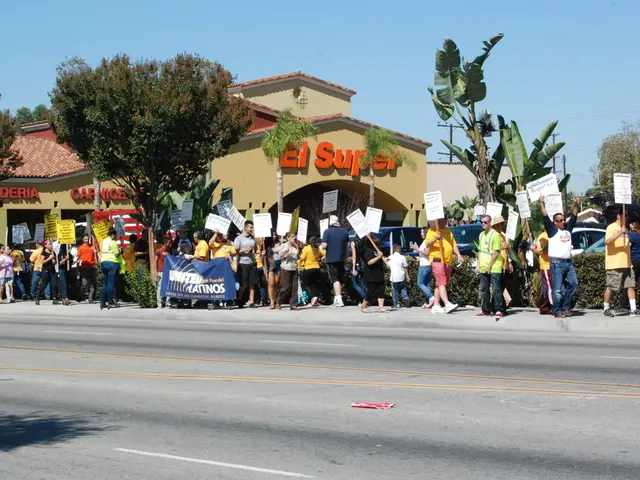Federal Environmental Protection Agency under scrutiny for alleged manipulation of soil sample results following East Palestine catastrophe
In February 2023, a Norfolk Southern freight train carrying tonnes of industrial chemicals derailed in East Palestine, Ohio, causing a significant environmental concern. The leaked chemicals then burned for more than two days before authorities decided to perform 'controlled burns' of several railcars, including those containing vinyl chloride, an action that was approved by the Environmental Protection Agency (EPA) [2][4].
However, recent accusations have been levelled against the EPA. A whistleblower group, the Government Accountability Project (GAP), has alleged that the EPA helped Norfolk Southern Railway manipulate soil testing data after the derailment [3]. A leaked letter obtained through a freedom of information request shows the EPA agreed not to test for five organochlorine compounds in its soil sampling plan [6].
These omitted compounds, which can be indicators for dioxin formation, include 2,3,4,6-tetrachlorophenol, 1,2,4,5-tetrachlorobenzene, pentachlorobenzene, 1,2,3-trichlorobenzene, and 1,2,4-trichlorobenzene [7]. Lesley Pacey, GAP's senior environmental officer, suggests the EPA's reasons for not screening for these chemicals might include claims they were irrelevant to vinyl chloride, concerns about analytical cost or complexity, and a desire to downplay the extent of the contamination [8].
The implications of omitting chlorinated compound testing are significant for assessing soil and groundwater contamination. Chlorinated compounds can persist in the environment and pose health risks. Without testing for these, the full extent of chemical contamination in soil and water near East Palestine may have been underestimated or overlooked, complicating efforts to evaluate and remediate potential hazards accurately [1].
These allegations have raised concerns about the adequacy of the EPA's monitoring and the transparency of their data, and they have contributed to public distrust regarding the environmental impact assessment of the derailment. The broader context includes fears of contaminated drinking water and long-term health risks associated with chemical releases during such industrial accidents, highlighting the need for comprehensive testing protocols that include all relevant pollutant classes [3][5].
In response to these allegations, an EPA spokesperson stated that the agency is "very concerned" by the accusations and intends to conduct a thorough review of decisions made in the aftermath of the train derailment [9].
Meanwhile, it was announced on 29 July that Norfolk Southern will be acquired by larger rival Union Pacific in an $85 billion deal [10]. The merger has been opposed by the Alliance for Chemical Distribution, arguing that it will benefit the merging rail companies and investors at the expense of chemical distribution companies [11].
References:
- EPA Omitted Chlorinated Compound Testing After East Palestine Train Derailment
- East Palestine Train Derailment: Controlled Burns of Railcars Approved by EPA
- Government Accountability Project Accuses EPA of Helping Norfolk Southern Manipulate Soil Testing Data
- Norfolk Southern Train Derailment: What Happened in East Palestine, Ohio?
- Health Concerns After East Palestine Train Derailment
- Leaked Letter Shows EPA Agreed Not to Test for Five Organochlorine Compounds
- List of Omitted Organochlorine Compounds
- GAP's Senior Environmental Officer's Statements
- EPA Spokesperson's Response to Allegations
- Norfolk Southern to be Acquired by Union Pacific in $85 Billion Deal
- Alliance for Chemical Distribution Opposes Norfolk Southern Merger
Read also:
- More than 7,000 instances of Chikungunya virus documented in China during significant outbreak
- Incidence of brain aneurysms, along with associated facts
- Eye alterations triggered by Macular Degeneration: Insight into visual experiences, distant vision, and further aspects
- Treatment options for mouth cancer via radiation: A guide to the process






